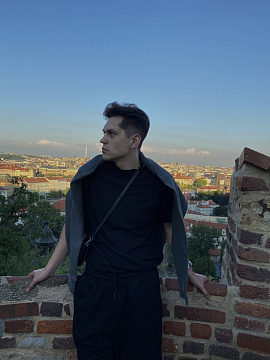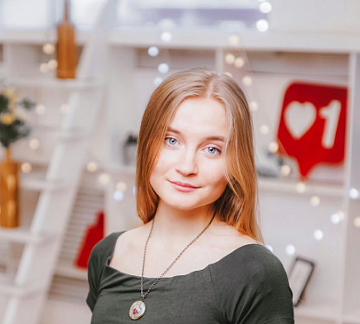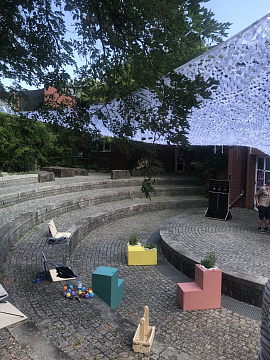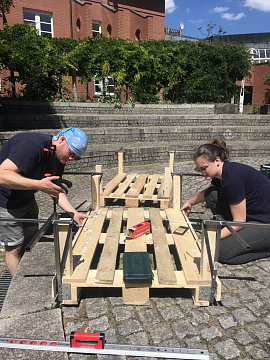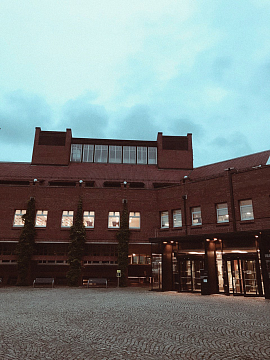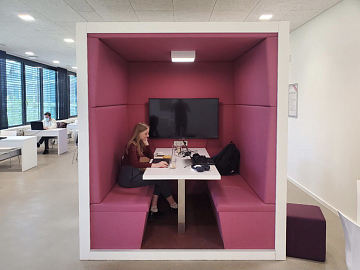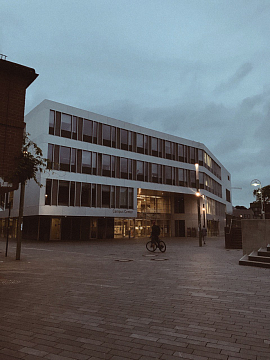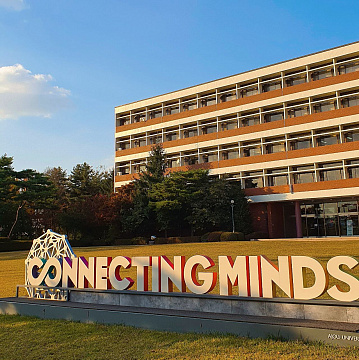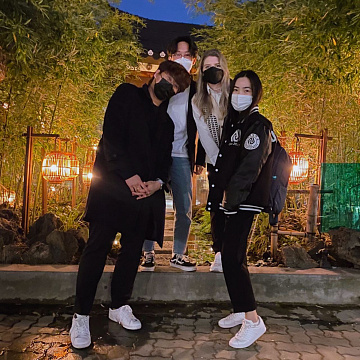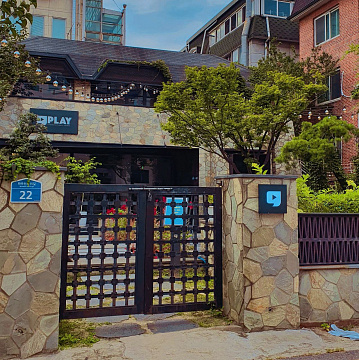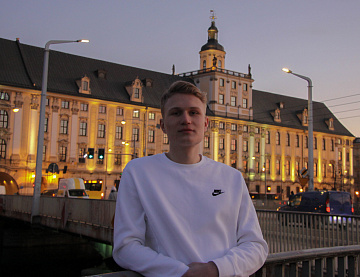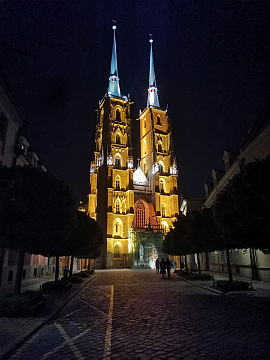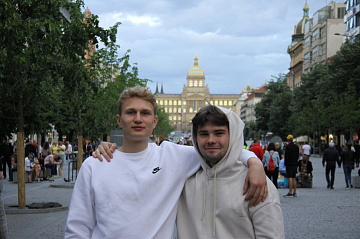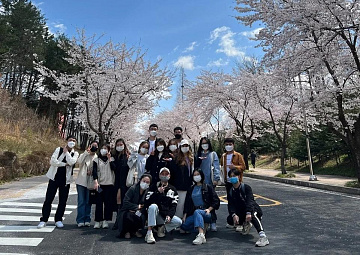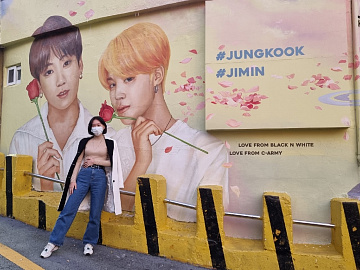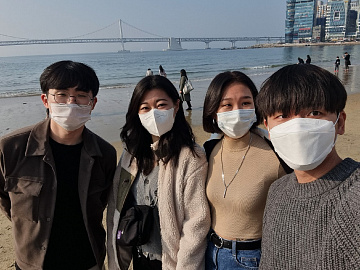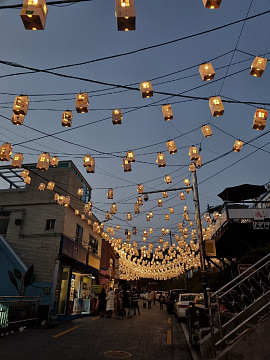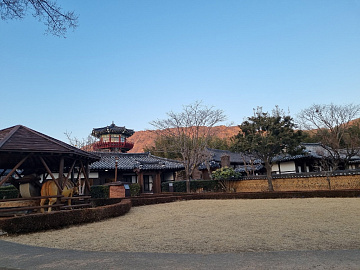2022, Anton Zamashchikov 

I liked the internship, it was a very interesting experience, I am glad that I was able to take advantage of the opportunity to live and study in Poland. The main thing is to improve the English language and, of course, study in one of the best universities in Poland. I will definitely remember this period of my life forever. It was very interesting, a lot of new acquaintances, communication with students fr om different countries of the world. Of course, we faced problems because of the sanctions, but we managed to solve them. The first problem is the blocking of cards, and the second is the closure of borders. But despite all this, I really liked the trip, both academically and in terms of free time.
Difficulties at the stages of preparation for the internship
There were no special difficulties at the preparation stage. I would advise future participants of the academic mobility program to fill out all forms and collect all documents immediately, without delay.
Obtaining a visa
The visa was received quickly and without problems. I would advise you to contact the VFS GLOBAL visa application center directly, because that's wh ere you need to apply and get a visa. There are many different visa centers, but they charge money for filling out papers and registering at the VFS visa center. You can easily do it by yourself, you just need to register in advance on the website.
Difficulties upon arrival at the host foreign organization
When we arrived, we did not have half of the subjects that we chose, so we need to immediately, if possible, choose more subjects that suit you and write about this problem to the curator from the host university.
My expenses related to participation in an internship abroad
Visa 8000 rub
Flight from Irkutsk to Warsaw and train to Wroclaw 30000 rub
Travel by public transport 40 rub
Meals for a month per person, if you cook by yourself 8000 rub
For example:
Chicken fillet 0.5 kg 220 rub
Milk ll 45 rub
Yogurt 400g 45 rub
Accommodation in a hostel + utilities I l000 rub Deposit to the hostel upon check-in 8000 rub
Difficulties at the stages of preparation for the internship
There were no special difficulties at the preparation stage. I would advise future participants of the academic mobility program to fill out all forms and collect all documents immediately, without delay.
Obtaining a visa
The visa was received quickly and without problems. I would advise you to contact the VFS GLOBAL visa application center directly, because that's wh ere you need to apply and get a visa. There are many different visa centers, but they charge money for filling out papers and registering at the VFS visa center. You can easily do it by yourself, you just need to register in advance on the website.
Difficulties upon arrival at the host foreign organization
When we arrived, we did not have half of the subjects that we chose, so we need to immediately, if possible, choose more subjects that suit you and write about this problem to the curator from the host university.
My expenses related to participation in an internship abroad
Visa 8000 rub
Flight from Irkutsk to Warsaw and train to Wroclaw 30000 rub
Travel by public transport 40 rub
Meals for a month per person, if you cook by yourself 8000 rub
For example:
Chicken fillet 0.5 kg 220 rub
Milk ll 45 rub
Yogurt 400g 45 rub
Accommodation in a hostel + utilities I l000 rub Deposit to the hostel upon check-in 8000 rub
2022, Aleksandra Nadolskaia 

The exchange semester in Germany gave me a lot of impressions and opportunities. The most important result of the trip for me is the realization of language knowledge.
I have been learning German since school and I have a certificate confirming my knowledge of C1 level. I think it's great to have and use the opportunity to practice the language in the country with native speakers, and also to go deeper into the language at the level of your field of study.
It's an incredible experience, not only in terms of language skills, but also in terms of professional knowledge. In addition, in Germany I had the opportunity to improve my English, the university offered a variety of free language courses. So, I took an engineering English course at the B1/B2 level. All the exchange students at the university speak only English.
So I had the opportunity to practice language every day, which has always been more difficult for me than German. It is very important to learn languages, it gives a huge platform to start and an unlimited number of opportunities.
Also for me personally, this trip was an opportunity to see my family, because my sister has been living in Germany for three years and in general I have a lot of friends fr om school there.
The experience in the professional sphere is tremendous. It is very interesting to exchange ideas with people of the same profession, but from another country. A lot of insights emerge, and since my profession is quite creative, getting to know other perceptions of the architectural field gives inspiration to strive for new things.
- What challenges did you encounter in the stages of preparing for your internship?
The main difficulty before the trip was preparing documents and opening a bank account. I was familiar with this process, and my sister helped me a lot. To have time to get a visa you need to make an appointment at the embassy in Novosibirsk. I advise to do this even before the official confirmation comes from the host university.
Get the reception is still possible not earlier than a month after contacting the embassy. In general, as soon as it becomes known that the university is ready to accept you, you should immediately begin to prepare the documents for a visa, insurance and blocked account. To open an account and arrange the insurance, I used the virtual bank Fintiba.
It is very convenient, you can download the app to your phone and do everything from the comfort of your home. In addition, the whole procedure will be described step by step.
- Describe the process of getting a visa. Your tips for future participants of the academic mobility program.
You need many documents to apply for visa. Your motivation letter and curriculum vitae are especially important. You need to write them also when you apply to the university. I used the same motivation letter, but slightly adjusted content for the consulate. All documents should be checked before you travel, make sure there are enough copies of each document. Reception time at the embassy is usually in the morning, so it is very important to buy a suitable train ticket to Novosibirsk.
- What difficulties arose on arrival at the receiving foreign organization?
When you arrive to a completely different country wh ere people speak a different language, you need to adapt quickly. Fr om the airport you will most likely have to get to the city wh ere the university is located. So you need to think ahead about how to do this. In Germany is very well developed intercity transport links, you can safely travel fr om city to city on trains or buses Flixbus. If you have any friends from the country you are going to, it is best to contact them, ask them to buy a bus or train ticket for you in advance.
Also, so that money from an open bank account can flow into a personal account, you need to open one. In Germany, such a bank is called Sparkasse, which is the same as the Sberbank in Russia. Go there in the first days of the stay, because the card will be issued a few weeks. Before that you should make sure that you have a sufficient amount of cash for that period.
- Indicate your expenses related to participation in the foreign internship
The biggest money contribution for the whole trip will be oppening of the bank account, which is 5000 EUR for half a year and 10000 EUR for a year. It is necessary to have these funds in the bank account in order to certify to the German state that the foreign student will not be in poverty. Without this amount of money in the account you will not be able to obtain a visa. This money will then come into your personal account of 800 EUR per month for the duration of your stay in Germany. This is more than enough to live in Germany and pay your rent.
The total cash fee for the national visa is about $ 70, in addition you need to take into account that you will need money for the train ticket to Novosibirsk and back. Upon arrival in Germany will need to get to the city wh ere the university is located. Consequently, there will be costs for transportation, the cost of a train or bus ticket depends on the distance from the city to the airport. Usually the cost varies from 15 - 70 EUR. The earlier to buy a ticket - the cheaper its cost.
Also you should take into account that though education in Germany is free of charge, you will have to pay semester tuition fee that usually amounts from 200 - 400 EUR.
With this money will be issued a student card, with which you can take buses and trolley buses in the city and between neighboring cities at no extracharge.
All medical services will be at the expense of the insurance, so that in case of illness, if necessary, you will have to spend money only on medicines from the pharmacy. Pharmacies in Germany are expensive. Most of our usual drugs are many times more expensive, so it is better to stock up on the necessary ones from Russia.
Meals in Germany is quite expensive, you should be prepared for the fact that when you go to any cafe will have to spend at least 10 euros.
A very good option for students are canteens at universities.
There is always a large selection of dishes and the price is oriented to student life. Lunch in the canteen costs no more than 3 EUR.
I have been learning German since school and I have a certificate confirming my knowledge of C1 level. I think it's great to have and use the opportunity to practice the language in the country with native speakers, and also to go deeper into the language at the level of your field of study.
It's an incredible experience, not only in terms of language skills, but also in terms of professional knowledge. In addition, in Germany I had the opportunity to improve my English, the university offered a variety of free language courses. So, I took an engineering English course at the B1/B2 level. All the exchange students at the university speak only English.
So I had the opportunity to practice language every day, which has always been more difficult for me than German. It is very important to learn languages, it gives a huge platform to start and an unlimited number of opportunities.
Also for me personally, this trip was an opportunity to see my family, because my sister has been living in Germany for three years and in general I have a lot of friends fr om school there.
The experience in the professional sphere is tremendous. It is very interesting to exchange ideas with people of the same profession, but from another country. A lot of insights emerge, and since my profession is quite creative, getting to know other perceptions of the architectural field gives inspiration to strive for new things.
- What challenges did you encounter in the stages of preparing for your internship?
The main difficulty before the trip was preparing documents and opening a bank account. I was familiar with this process, and my sister helped me a lot. To have time to get a visa you need to make an appointment at the embassy in Novosibirsk. I advise to do this even before the official confirmation comes from the host university.
Get the reception is still possible not earlier than a month after contacting the embassy. In general, as soon as it becomes known that the university is ready to accept you, you should immediately begin to prepare the documents for a visa, insurance and blocked account. To open an account and arrange the insurance, I used the virtual bank Fintiba.
It is very convenient, you can download the app to your phone and do everything from the comfort of your home. In addition, the whole procedure will be described step by step.
- Describe the process of getting a visa. Your tips for future participants of the academic mobility program.
You need many documents to apply for visa. Your motivation letter and curriculum vitae are especially important. You need to write them also when you apply to the university. I used the same motivation letter, but slightly adjusted content for the consulate. All documents should be checked before you travel, make sure there are enough copies of each document. Reception time at the embassy is usually in the morning, so it is very important to buy a suitable train ticket to Novosibirsk.
- What difficulties arose on arrival at the receiving foreign organization?
When you arrive to a completely different country wh ere people speak a different language, you need to adapt quickly. Fr om the airport you will most likely have to get to the city wh ere the university is located. So you need to think ahead about how to do this. In Germany is very well developed intercity transport links, you can safely travel fr om city to city on trains or buses Flixbus. If you have any friends from the country you are going to, it is best to contact them, ask them to buy a bus or train ticket for you in advance.
Also, so that money from an open bank account can flow into a personal account, you need to open one. In Germany, such a bank is called Sparkasse, which is the same as the Sberbank in Russia. Go there in the first days of the stay, because the card will be issued a few weeks. Before that you should make sure that you have a sufficient amount of cash for that period.
- Indicate your expenses related to participation in the foreign internship
The biggest money contribution for the whole trip will be oppening of the bank account, which is 5000 EUR for half a year and 10000 EUR for a year. It is necessary to have these funds in the bank account in order to certify to the German state that the foreign student will not be in poverty. Without this amount of money in the account you will not be able to obtain a visa. This money will then come into your personal account of 800 EUR per month for the duration of your stay in Germany. This is more than enough to live in Germany and pay your rent.
The total cash fee for the national visa is about $ 70, in addition you need to take into account that you will need money for the train ticket to Novosibirsk and back. Upon arrival in Germany will need to get to the city wh ere the university is located. Consequently, there will be costs for transportation, the cost of a train or bus ticket depends on the distance from the city to the airport. Usually the cost varies from 15 - 70 EUR. The earlier to buy a ticket - the cheaper its cost.
Also you should take into account that though education in Germany is free of charge, you will have to pay semester tuition fee that usually amounts from 200 - 400 EUR.
With this money will be issued a student card, with which you can take buses and trolley buses in the city and between neighboring cities at no extracharge.
All medical services will be at the expense of the insurance, so that in case of illness, if necessary, you will have to spend money only on medicines from the pharmacy. Pharmacies in Germany are expensive. Most of our usual drugs are many times more expensive, so it is better to stock up on the necessary ones from Russia.
Meals in Germany is quite expensive, you should be prepared for the fact that when you go to any cafe will have to spend at least 10 euros.
A very good option for students are canteens at universities.
There is always a large selection of dishes and the price is oriented to student life. Lunch in the canteen costs no more than 3 EUR.
2022, Elena Ryzhikova 

- What are your impressions of the internship in general? What results have you been able to achieve?
It was quite an interesting experience and I got a lot of positive impressions from the internship. I improved my English, I took an exam during the semester and got a C1 advanced certificate. After the courses related to game design and development I decided to change my job, so I guess you could say the experience helped me find my career path.
- What difficulties did you encounter in preparing for your internship?
Basically, all the difficulties were a complete lack of information about the difference between the education system in Russia and the Republic of Korea. When preparing documents for the exchange program, you are obliged to approve the list of subjects to be taken at the partner university, but in reality this is not possible. In Korea there is a certain period when course registration opens and all students start registering in their personal account at the same time and the courses are taken in a couple of minutes. Popular courses such as AI or Professional IT English have been taken in less than 5 seconds. There can be misunderstandings with the academic dean's office at INRTU because of this.
- Describe the process of getting a visa. Your tips for future participants of academic mobility programme.
The visa process and documentation package are updated every year, so you should check the embassy website for up-to-date information. The consular fee is $80.
- What are the difficulties in arriving at the host institution abroad?
I did not have any problems, except for quarantine and blocking of bank cards. In the first week of study, the coordinators explain in detail all the processes of paying for dormitory, enrolling in courses, applying for insurance, etc. The university also has a system of "mentors", a volunteer movement of Korean students who help international students with different issues and give field trips.
- Specify your expenses related to participating in a foreign internship...
Visa: $80
Quarantine: ₩1,400,000
University fee: ₩60,000
ARC fee: ₩30,000
Health insurance: ₩56,000 per month
Dormitory: ₩1,264,000 per semester
It was quite an interesting experience and I got a lot of positive impressions from the internship. I improved my English, I took an exam during the semester and got a C1 advanced certificate. After the courses related to game design and development I decided to change my job, so I guess you could say the experience helped me find my career path.
- What difficulties did you encounter in preparing for your internship?
Basically, all the difficulties were a complete lack of information about the difference between the education system in Russia and the Republic of Korea. When preparing documents for the exchange program, you are obliged to approve the list of subjects to be taken at the partner university, but in reality this is not possible. In Korea there is a certain period when course registration opens and all students start registering in their personal account at the same time and the courses are taken in a couple of minutes. Popular courses such as AI or Professional IT English have been taken in less than 5 seconds. There can be misunderstandings with the academic dean's office at INRTU because of this.
- Describe the process of getting a visa. Your tips for future participants of academic mobility programme.
The visa process and documentation package are updated every year, so you should check the embassy website for up-to-date information. The consular fee is $80.
- What are the difficulties in arriving at the host institution abroad?
I did not have any problems, except for quarantine and blocking of bank cards. In the first week of study, the coordinators explain in detail all the processes of paying for dormitory, enrolling in courses, applying for insurance, etc. The university also has a system of "mentors", a volunteer movement of Korean students who help international students with different issues and give field trips.
- Specify your expenses related to participating in a foreign internship...
Visa: $80
Quarantine: ₩1,400,000
University fee: ₩60,000
ARC fee: ₩30,000
Health insurance: ₩56,000 per month
Dormitory: ₩1,264,000 per semester
2022, Ivan Rogachev 

It was an unforgettable trip in which I met many interesting people, saw the beautiful architecture of Wroclaw, improved my level of English, and, of course, acquired new knowledge in my specialty.
Preparation of all documents for the internship was difficult, but the international department provided active assistance.
The teachers at the university were responsive and loyal to us, they gave us a lot of useful knowledge. But there were also difficulties. The first difficulty I encountered during my studies was the choice of subjects. Each subject is divided into many components, such as: lectures, practical classes, laboratory work, project work. For each of these areas of study, an assessment or credit is given. Therefore, students who are going to study in Poland should carefully look at how many components their subject is divided into.
Poland greeted me warmly, I received gifts fr om the University of Wroclaw (a bag, a mug, headphones and various souvenirs). Quite fast I was given a student card, which I could use to go by public transport and eat with a discount.
A Schengen visa gives you the chance to visit other European countries. For example, I was in the Czech Republic, wh ere I had long dreamed of being. I ate traditional food there and walked along the Charles Bridge.
I would like to visit more countries, but all my free time was spent studying.
Preparation of all documents for the internship was difficult, but the international department provided active assistance.
The teachers at the university were responsive and loyal to us, they gave us a lot of useful knowledge. But there were also difficulties. The first difficulty I encountered during my studies was the choice of subjects. Each subject is divided into many components, such as: lectures, practical classes, laboratory work, project work. For each of these areas of study, an assessment or credit is given. Therefore, students who are going to study in Poland should carefully look at how many components their subject is divided into.
Poland greeted me warmly, I received gifts fr om the University of Wroclaw (a bag, a mug, headphones and various souvenirs). Quite fast I was given a student card, which I could use to go by public transport and eat with a discount.
A Schengen visa gives you the chance to visit other European countries. For example, I was in the Czech Republic, wh ere I had long dreamed of being. I ate traditional food there and walked along the Charles Bridge.
I would like to visit more countries, but all my free time was spent studying.
2021-2022, Natalia Adushinova 

What is your impression of the internship to the Republic of Korea?
In September 2021, I set foot on the land of Korea with a plan to live here for a year.
Life in Korea has shown me that your every plan can fail, and Korean logic knows no bounds. Quarantine measures, moving to a hostel, problems with the bank, cards, documents and other things. But it showed me that I, it turns out, can solve even a ridiculous problem. But, living here, I took a deep breath. So much has happened in a year that there is not enough life to tell.
During the year I’ve met so many people, traveled around Korea, improved my Korean language skills, and also seen a lot of opportunities, visited some doram dates, eaten so many delicious and new food and gained unreal experience of living abroad.
About the difficulties at the stages of the internship
I went to South Korea during the COVID-19 and the main difficulties I had were plane tickets and quarantine. I recommend that all participants of this program learn in advance the rules of entry into the country.
The process of obtaining a visa
-a study visa (D-2) is required
-recipients: citizens of the Russian Federation who have a certificate of enrollment in a Korean educational or research institution above the college level
-a single-entry visa (without the right to re-enter the country)
-consular fee of 80 US dollars (banknotes from 1996 issue, without change, in cash currency, without marks and blots)
Difficulties upon arrival at the host foreign organization?
South Korea strictly treats the health of its citizens and ensures the safe stay of newcomers; therefore entry into this country requires a huge list of documents upon arrival.
Expenses related to participation in a foreign internship:
My expenses during the year:
Visa expenses - $ 80 = 5000 rubles.
The cost of the flight is 60,000 rubles.
Registration fee 70,000 won = 3100 rubles.
Insurance 1 month / 56,000 won = 2500 rubles
Public transport fare 1500 won = 70 RUB
Meals 2/day = 3760 won (≈200 rub)
3/day = 5400 won (≈300 rub)
In September 2021, I set foot on the land of Korea with a plan to live here for a year.
Life in Korea has shown me that your every plan can fail, and Korean logic knows no bounds. Quarantine measures, moving to a hostel, problems with the bank, cards, documents and other things. But it showed me that I, it turns out, can solve even a ridiculous problem. But, living here, I took a deep breath. So much has happened in a year that there is not enough life to tell.
During the year I’ve met so many people, traveled around Korea, improved my Korean language skills, and also seen a lot of opportunities, visited some doram dates, eaten so many delicious and new food and gained unreal experience of living abroad.
About the difficulties at the stages of the internship
I went to South Korea during the COVID-19 and the main difficulties I had were plane tickets and quarantine. I recommend that all participants of this program learn in advance the rules of entry into the country.
The process of obtaining a visa
-a study visa (D-2) is required
-recipients: citizens of the Russian Federation who have a certificate of enrollment in a Korean educational or research institution above the college level
-a single-entry visa (without the right to re-enter the country)
-consular fee of 80 US dollars (banknotes from 1996 issue, without change, in cash currency, without marks and blots)
Difficulties upon arrival at the host foreign organization?
South Korea strictly treats the health of its citizens and ensures the safe stay of newcomers; therefore entry into this country requires a huge list of documents upon arrival.
Expenses related to participation in a foreign internship:
My expenses during the year:
Visa expenses - $ 80 = 5000 rubles.
The cost of the flight is 60,000 rubles.
Registration fee 70,000 won = 3100 rubles.
Insurance 1 month / 56,000 won = 2500 rubles
Public transport fare 1500 won = 70 RUB
Meals 2/day = 3760 won (≈200 rub)
3/day = 5400 won (≈300 rub)
Submit a review
Please leave your comments with photos regarding your exchange studies


